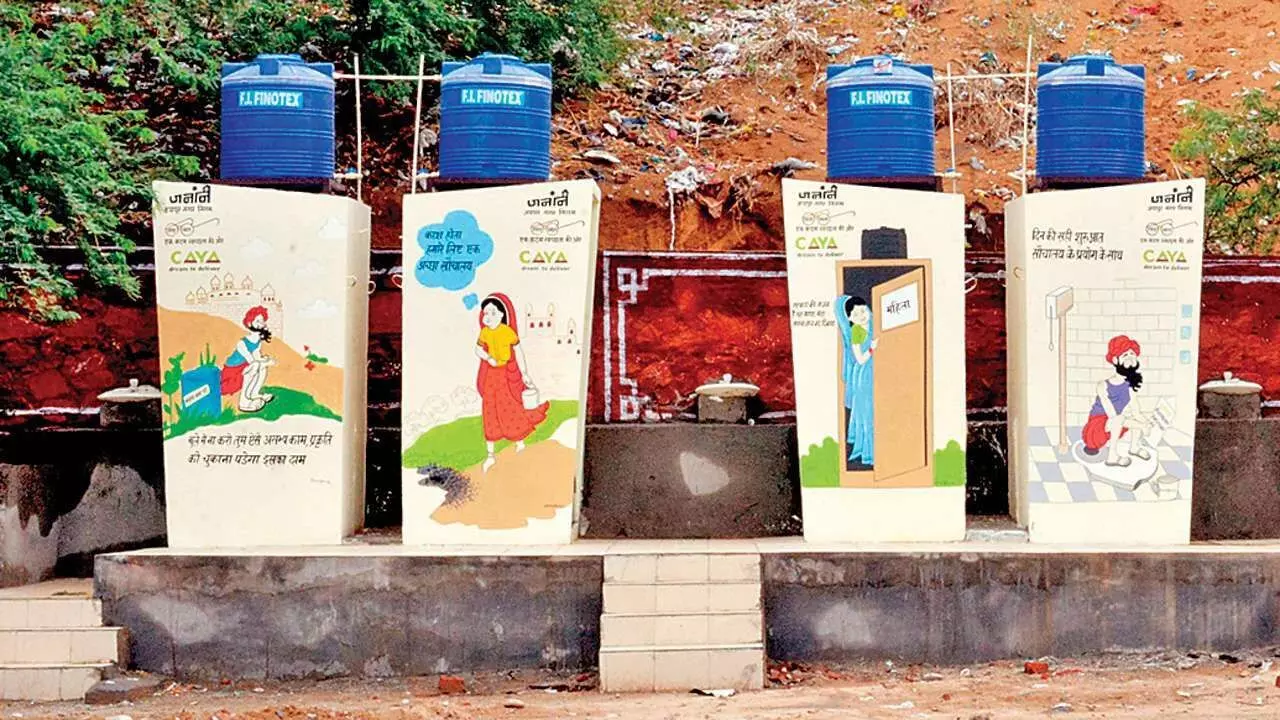India: Major milestone in sanitation with 50% villages achieving ODF Plus status
As of now, over 2.96 lakh villages have declared themselves ODF Plus, a major step towards achieving the SBM-G Phase II goals by 2024-25
By Newsmeter Network
New Delhi: In a significant achievement, India has declared 50% of its villages as Open Defecation Free (ODF) Plus under Phase II of the Swachh Bharat Mission Gramin (SBM-G). This means that these villages have sustained their ODF status and have implemented either solid or liquid waste management systems.
As of now, over 2.96 lakh villages have declared themselves ODF Plus, a major step towards achieving the SBM-G Phase II goals by 2024-25.
Top performing States/UTs
States like Telangana, Karnataka, Tamil Nadu, and Uttar Pradesh have shown impressive progress with 100%, 99.5%, 97.8%, and 95.2% of ODF Plus villages respectively. Among small states, Goa and Sikkim have emerged as top performers with 95.3% and 69.2% respectively. In the UTs, Andaman & Nicobar Islands, Dadra Nagar Havelli & Daman Diu, and Lakshadweep have achieved 100% ODF Plus status in their model villages.
ODF Plus Villages
Of the total ODF Plus villages, 2,08,613 are ODF Plus Aspiring villages with arrangements for solid waste management or liquid waste management, 32,030 are ODF Plus Rising villages with arrangements for both solid waste management and liquid waste management, and 56,285 are ODF Plus Model villages.
These model villages sustain their ODF status and have arrangements for both solid and liquid waste management, minimal litter, stagnant wastewater, and no plastic waste dump in public places. They also display ODF Plus Information, Education & Communication (IEC) messages.
Contributions and Funding
The Swachh Bharat Mission Gramin has received a total allocation of INR 83,938 crore from the central government between 2014-15 and 2021-22. The allocation for the year 2023-24 is INR 52,137 Crore. In addition, the 15th Finance Commission has also allocated funds for sanitation. These funds have been utilized to build sanitation assets, promote behavior change, and implement solid and liquid waste management systems.
Components of SBM-G Phase II
This year marks the ninth year of the Swachh Bharat Mission, which has been instrumental in improving the health and well-being of millions of people across the country. Phase II of the SBM-G program focuses on Sustaining Open Defecation Free Status (ODF-S), Solid (Bio-degradable) Waste Management, Plastic Waste Management (PWM), Liquid Waste Management (LWM), Faecal Sludge Management (FSM), GOBARdhan, Information Education and Communication/Behavior Change Communication (IEC/BCC), and Capacity Building.
Progress in Waste Management
In terms of plastic waste management, 831 Plastic Waste Management Units and 1,19,449 waste collection & segregation sheds have been set up. More than 1 lakh Gram Panchayats have passed a resolution for a ban on Single Use Plastic (SUP). Additionally, 683 functional Bio-Gas/CBG Plants have been set up across 206 districts.
For bio-degradable waste management at the household level, people are being encouraged to segregate their dry and wet (organic) waste at source for composting at the community level. 3,47,094 community compost pits have been constructed so far. GOBARdhan, which stands for Galvanising Organic Bio-Agro Resources-dhan, is an initiative to support biodegradable waste recovery, conversion of waste into resources, and creating clean & green villages.
Toward a Cleaner and Healthier India
The accomplishment of 50% ODF Plus villages is a momentous achievement for India and demonstrates the country's commitment to sanitation and hygiene. The Swachh Bharat Mission Grameen played a crucial role in enhancing the health and well-being of millions of people nationwide.
Recent initiatives undertaken by the Department of drinking water and sanitation under Swachh Bharat Mission – Grameen
Swachh Survekshan Grameen (SSG)
- Swachh Survekshan Grameen (SSG) is being conducted since 2018 to rank the States and Districts on the basis of their performance on key quantitative and qualitative Swachh Bharat Mission Grameen parameters.
- SSG has proven to be not just a ranking exercise but also a vehicle for creating a ‘Jan Andolan’ (people’s movement) and ensuring prompt action for achievement of SBM(G) targets.
- This year, SSG 2023 is being conducted with an objective to make it more participatory by introducing Panchayat Self-Assessment on ODF Plus parameters.
- SSG ensures continued participation of the GPs throughout the year in the SBM-G programme through Self-Assessment and Peer Verification
- As part of SSG, Rewards, Awards and Recognition of states/UTs along with their blocks & districts is done at National, State and District levels.
- As on date more than 99% GPs completed their Baseline SelfAssessment and currently all GPs are undertaking Peer Verification.
Retrofit to Twin Pit Abhiyan
- To ensure safe disposal of the faecal sludge in rural areas, Retrofit to Twin Pit Campaign was launched
- This campaign is focused on safe disposal of faecal sludge through simple on-site methodology i.e. twin pits and retrofitting of toilets, particularly converting single pit toilets to twin-pit toilets and safe management of effluent from septic tanks by construction of additional pit.
- As on date nearly 5 lakh retro-fittings have been completed.
Swachh Iconic Places
- Initiative wherein all stakeholders are involved for maintaining cleanliness of 100 places across India that are “iconic” due to their heritage, religious and/or cultural significance i.e. Ajmer Sharif Dargah, Ajmer, Rajasthan, CST, Mumbai, Maharashtra, Golden Temple, Amritsar, Punjab, Kamakhya Temple, Guwahati, Assam, Maikarnika Ghat, Varanasi, Uttar Pradesh, Meenakshi Temple, Madurai, Tamil Nadu, to name a few.
- In last four phases, 39 Iconic places and heritage sites of historical, spiritual, and cultural significance have been selected and Public Sector Undertakings (PSUs) are financially supporting the SIP sites.
- Currently 29 SIP sites out of 39 SIP sites have been mapped with PSUs.
Other activities
- Launch of SBM 2.0 Mobile App to capture SLWM progress
- Engaging women SHGs in SLWM and providing them with income generation opportunities and
- SBM academy - IVRS based (online course)